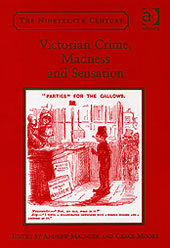Victorian Crime, Madness and Sensation The Nineteenth Century Series
Auteur : Maunder Andrew
Coordonnateur : Moore Grace

Contents: Introduction, Andrew Maunder & Grace Moore; Regicide and reginamania: G.W.M. Reynolds and The Mysteries of London, John Plunkett; The making of a master criminal: the 'chief of the thugs' in Victorian writings on crime, Máire nà Fhlathúin; Black markets and cadaverous pies: the corpse, urban trade and industrial consumption in the Penny Blood, Sally Powell; 'Stepchildren of nature': East Lynne and the spectre of female degeneracy, 1860-61, Andrew Maunder; Murder, gender, and popular fiction by women in the 1860s: Braddon, Oliphant, Yonge, June Sturrock; Anatomy of a 'nine days' wonder': sensational journalism in the decade of the sensation novel, Dallas Liddle; The inside story: crime, convicts, and careers for women, Barbara Onslow; 'The truth of midnight' and 'The truth of noonday': sensation and madness in James Thomson's The City of Dreadful Night, Dafydd Moore; Puffed papers and broken promises: white-collar crime and literary justice in The Way We Live Now, Karen Odden; Something to Hyde: the 'strange preference' of Henry Jekyll, Grace Moore; The novelization of the Dreyfus Affair: femininity and sensation in fin-de-siècle France, Christopher E. Forth; 'Furious passions of the Celtic race': Ireland, madness and Wilkie Collins's Blind Love, Maria K. Bachman; Time's hand: fingerprints, empire, and Victorian narratives of crime, Gita Panjabi Trelease; Vamping the children: the 'Bloofer Lady', the 'London Minotaur' and child-victimization in late 19th-century England, Leslie Ann Minot; Ballad of a demon barber: the criminal career of George Chapman, Nicholas Freeman; Bibliography; Index.
Date de parution : 12-2004
15.6x23.4 cm
Date de parution : 09-2016
15.6x23.4 cm
Thèmes de Victorian Crime, Madness and Sensation :
Mots-clés :
Young Men; Church; Lady Audley; Crime; fiction; Constance Kent; Novel; penny; Penny Blood; Scandal; dreadful; Road Murder; Sensation fiction; constance; Inside Story; Insanity; kent; Van Diemen’s Land; Literature; lady; Capital Punishment; Newspaper; audley's; Barbara Bodichon; Colonies; secret; Lady Carbury; Government; henry; Periodical Reviewers; Law; maudsley; Maiden Tribute; British India; criminal psychology; White Collar Crime; Children; liminal texts; Times Manic Behaviour; Labourers; Victoria's enthronement; Tartar Emetic; Marriage; Victorian fascination; Queen’s Lovers; Medicine; Norwood Builder; Poetry; Lady Audley’s Secret; Building industry; Barbara Hare; Police; St John’s House; Monarchy; Railway Scheme; Periodicals; Robert Audley; Relationships; Dangerous Lunatics Act; Journalism; Daisy Chain; Animals; Roger Carbury; Economic crises; Friendship; Trade union; Disease; Nationalism; Prisons; Strikes; Alcohol



